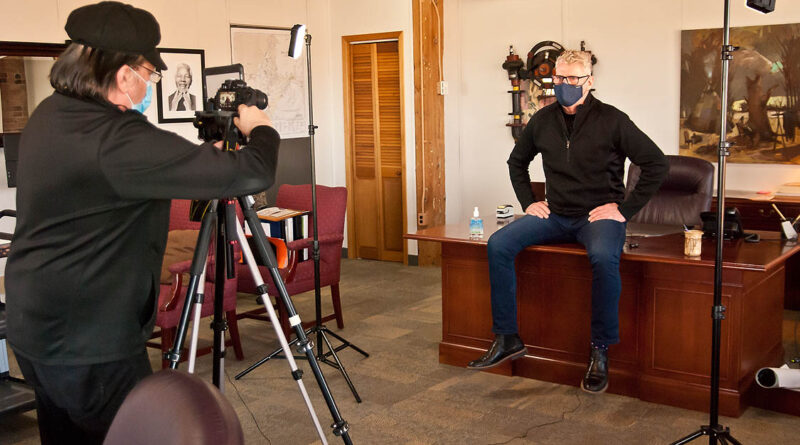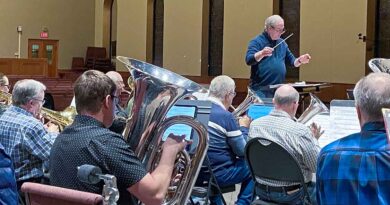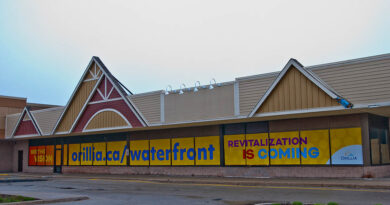One Year Later, A Conversation With Mayor Clarke
By John Swartz
Today is the anniversary of Mayor Steve Clarke doing the one thing he never thought he’d have to do, declare a state of emergency in Orillia. The province declared one three days earlier, but it seemed necessary to do so here too.
Once the decision was made, things moved quickly. Council met in the afternoon to weigh in and vote, the mayor recorded a video making the announcement and it was out in the wild by 6 p.m.
“It’s actually a unilateral decision of a municipal mayor in Ontario, but I will say it was decision of the emergency management committee to take it to council for council’s blessing. Council is an important part of the over all process and we wanted to make sure they were on board with it as well,” said Clarke. The wheels were turning weeks beforehand.
“It would have been in February where the CAO and I were having a conversation and I believe she reached out right away to the fire chief.” Orillia fire chief Brent Thomas is the person responsible for maintaining the plan, keeping it up to date. In 2006 the province passed the Emergency Management and Civil Protection Act which required all municipalities to create a plan. Ralph Dominelli was the fire chief at the time and until then Orillia didn’t have a formal plan, a binder, full of all the possible reactions, what to do, who to call, etc., to various kinds of emergencies.
The mayor, fire chief, CAO Gayle Jackson and Communications manager Jennifer Ruff are the emergency management committee (EMC). There are several other committees with broader community representation and functions, but the buck stops with those four.
“The number one thing we were concerned about is the health and safety of our community and protecting them,” said Clarke. “It (a declaration) was being contemplated maybe a week before the province made their declaration.
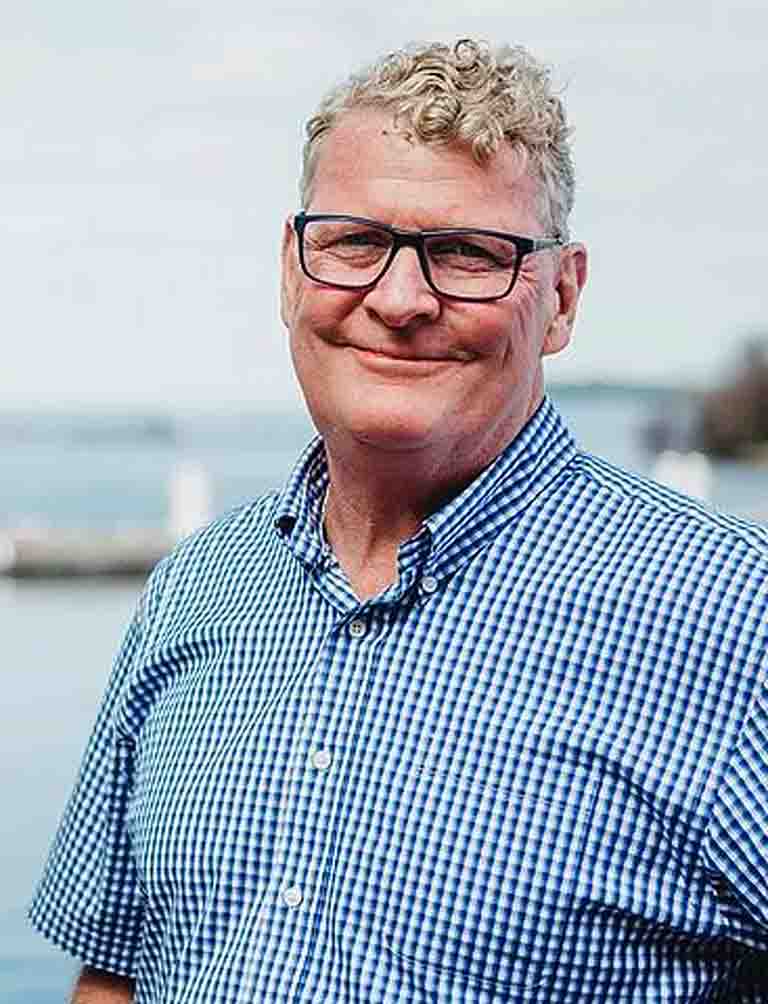
“Leading up to it, you don’t want to over react to a situation and you don’t want to under react, so it’s really making sure if you are going to go in a direction its justified. I remember some discussions around the EMC table whether it was necessary or not. You don’t want to set an alarm off in the community by jumping the gun, and yet you don’t want to be irresponsible and not have the tools in place to react to certain situations. I think in the end we felt it was necessary and as time has gone on it certainly seems like it was an absolute necessity.”
The declaration allowed the City to tailor its response inside the framework of the province’s declaration, which may have different needs and effects than another community might have.
“From the moment we realized we could be having to enforce the provincial measures as well as additional things we wanted to do in our community, we had to discern what was the province was responsible for, what was the health unit responsible for as far as communications and enforcement, and the OPP, what would they be responsible for and what would the City be responsible for including our by-laws.”
Good Thing There Was a Book
Declaring a disaster is way down the list of things a municipal mayor, or council, has on a to do list. Many communities have never had to do so. There was a time Orillia had to deal with an emergency, but it was so long ago, if a manual hadn’t been created, things might be different here. On February 28, 1982 1,200 people had to be evacuated when a freight train hauling toxic chemicals and inflammable liquids derailed. We’ve had floods, Couchiching Beach Park had most of the trees uprooted in a violent storm in 2014, but there hasn’t been anything of a level requiring an emergency declaration. Clarke understood the enormity of the decision he ultimately had to make.
“It meant that there was a lot of responsibility as a result of what was going on. As mayor I go through some training for emergency preparedness. We do not go through a lot of pandemic training, so it really was new and uncharted territory, but I did understand the gravity of the situation and the responsibility that came with it.”
“The gravity was palpable. In that situation you need to understand the weight of the situation and I believe we did just that.”
This was different. The word pandemic appears exactly once in the City’s emergency manual. Many of the responses there for other types of disasters are similar, but obviously not the same.
“As much as we’ve had to learn and evolve and pivot over the last year as situations arise and change, we had template, a model that guided us in the right direction and helped set up our structure.”
Despite the marching orders from the province granting authorities, and the instructions in the manual, while a emergency is declared council as a body does not have a role. Clarke and the management team decided there were some things which they could do unilaterally, but would instead take to council before acting.
“Depending on the nature of the decision and we have some delegated authority, but if it was a significant issue all four of us would insist it go to council. After every (EMC) meeting, all those meetings are being scribed and we provide briefing notes every one of those meetings to council and then to senior staff. That’s absolutely necessary to make sure council knows what’s going on, even some of the smaller items.”
Council held an emergency meeting the afternoon of the 20th. They were presented with the case for the declaration, and a list of things that would be enacted here. One thing emerged from the meeting which wasn’t in the report council got was setting aside emergency fund.
“I do not remember where the initial impetus for that consideration came from, but we knew two things would be predominant issues. This is going to be tough on everyone, but it was going to be extremely tough on our most vulnerable citizens, so the $100,000 was put aside to assist lead social agencies that deliver services to our vulnerable citizens. Those citizens are vulnerable at the best of times, let alone during a pandemic. Secondly we knew this was going to be based on the fact the province shut down and looking at other areas in the world where businesses had lost cash flow, people had lost jobs, helping the economy come out of this when it was time would be very key to Orillia’s economic health.”
Council has met many times or special meetings to deal with and approve aspects of the emergency plan as things have evolved. One was in May when a $1 million fund was set aside for economic recovery. So far only $120,000 has been allocated to create marketing campaigns to get people to shop local (instead of on Amazon) and to create the downtown pedestrian mall (which is the plan for this summer as well). How the remainder gets spent, if at all, remains to be determined.

Another time council was hastily called to meet was in the summer.
“One of the significant challenges we had was communications. You can do whatever you want but if that message isn’t penetrating the population then it’s not going to be very effective. It’s one thing to make a decision, but it’s another thing to make sure people are aware of the decision and understand the rational for that. And, making sure now we have the tools in place that we are doing everything we can to the health and safety of the people. That’s still our ongoing number one priority.”
The tool in question was restricting the ability for out-of-towners to use waterfront parks. Anyone who had been using the parks noticed in late June it was hard to find Orillians to say hello to at the waterfront and in Tudhope Park because of the surge of GTA residents coming here to BBQ and picnic. Council approved action with a one week window to put up signs and tell everyone.
“We extended the length of shifts, the days of the week they were working because we had a system built for normal operations and that stretched everybody very thin. I will say what we put in place it actually worked.”
Despite clear reasoning by council and the EMC, many people, particularly our neighbours in the townships, did not get why it was being done. Clarke took a lot of heat, locally, and in national media, for the decision. But, he had an unexpected, non-budget, bit of help making it work.
“I think the premier may have helped us by helping to publicize we had these parking restrictions. We were at a function, he was taking us to task for gouging, myself and (Barrie) Mayor Lehman. I said, “I get it, but I just want to you know it made a heck of a lot more work for my office and made things very interesting, but in the end I want to thank you because you really helped us get the word out. We couldn’t have paid for that kind of advertising,”” Clarke said. “It ended up having the desired effect and that was taking care of a situation that was overwhelming and uncontrollable.”
![]()



Things Learned And What’s Ahead
This week as the province is moving toward opening things up more, the medical community is warning Golden Horseshoe reports are showing the virus may be rebounding.
“The issue now is the variants of concern, mainly the B117, which is now I believe becoming the dominant strain of the COVID virus which is very concerning,” said Clarke.
That said, after one year, Clarke is happy the actions taken, and the community’s diligence has put Orillia in a good position. Despite the number of people who contracted COVID, and the deaths, we have managed to avoid the level of infection many other places experienced.
“It’s sad when you lose anyone anywhere, but even with the long term care centers in consideration, I’m very proud of our citizens and our business that are taking it very seriously and I believe those numbers are reflected in the data. The data clearly shows Orillia has the lowest case rate across the whole population in Simcoe County.”
‘We still have got to be very responsible for a while to get through this in a safe manner. People got it, they still get it, they’re behaving for the most part in a very wonderful and responsible way and that bears out in the numbers.”
Most understand the physical and economic effects, but there is another Clarke is concerned about.
“All through the pandemic, but especially in the last couple of months, this is having a serious effect on people’s physical health, those who come in contact with the virus, but the other impact it’s having on health is mental health. I know people that had mental health issues before COVID have had them exacerbated during COVID, and also those that didn’t suffer before COVID now are.”
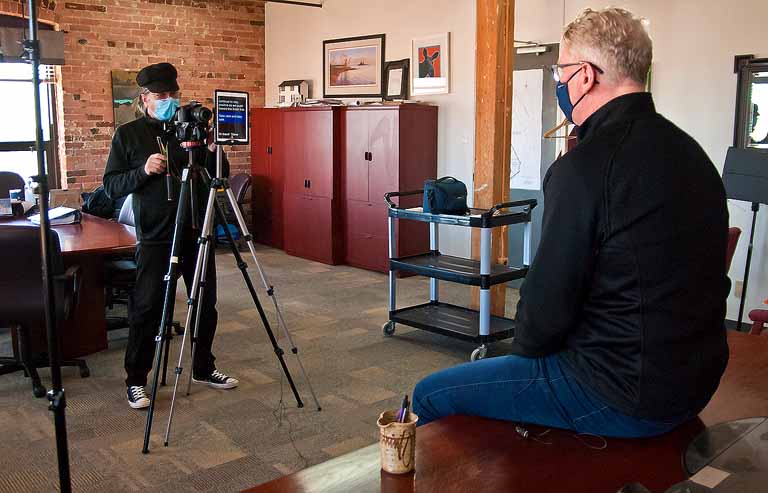
It looks like there is a light at the end of the tunnel and as Clarke said in his forthcoming video address to the community, it is getting bigger. He thinks there will be an end to the emergency declaration.
“Even today we had an emergency management meeting, number 307 by the way, and that came up today. It’s so hard to fathom it’s been a year. It’s an anniversary that’s not something to celebrate. I would say the only thing to celebrate in this last year is the behavior of the people in our community and the numbers, knock on wood, kind of bear that out. If there is something I want to say everybody about the last year its thank you, thank you, thank you for taking it seriously, for being concerned and as hard as it’s been being patient because that’s not easy.”
“My expectation, barring anything unforeseen, this emergency declaration will be over definitely this year. I’m hoping sooner than late this year. I still think we’re likely early summer before we can probably fully understand when that might be.”
(Photos by Swartz – SUNonline/Orillia) Main: Darcy Hoover and Orillia Mayor Steve Clarke shooting a video message to the community.

